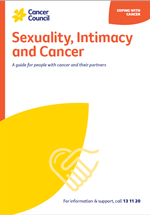- Home
- About Cancer
- Managing side effects
- Sexuality, intimacy and cancer
- Resuming sexual activity after treatment
- How to start a conversation about sex
How to start a conversation about sex
It’s hard to know what to say or how to begin a conversation sometimes. Even if these suggestions don’t fit your situation, they might give you a starting point.
With your partner |
With a new partner |
|
“I feel like I never have any energy for sex, but I’m worried about how you’re feeling about that. Maybe we can work out a plan together.” “I am going to show you the way I like to be touched and the places that are sore and out of bounds.” “I feel ready for sex again, but I’d like to take things slowly.” “I’m ready to cuddle, but worried you think I’m ready for sex – can we agree to just cuddle for now?” “There are some things I would like to try to do together that may help us feel close and connected, without ‘going all the way’.” “I really miss our sex life. When can we talk about being physically close again?” “That’s the right spot, but a lighter touch would feel good.” |
“The cancer treatment changed my body in different ways. It’s hard to talk about the changes, but I want you to know about them. The treatment left me with [a stoma/ erection problems/etc.].” “I really like where our relationship is going. I need you to know that I had cancer some years ago, but I’m afraid you might prefer to be with someone who hasn’t had cancer. What are your thoughts about it?” “I am still interested in sex, but we might have to be a little inventive.” “I haven’t had sex since my cancer treatment, and I’m worried about how things will go. How do you feel about taking things slowly?” “Before we get really serious, I want to let you know how cancer treatment affected my fertility. I can’t physically conceive children, but I’m willing to explore other ways of becoming a parent down the track.” |
→ READ MORE: Communicating with a new partner
Podcast: Sex and Cancer
Listen to more of our podcast for people affected by cancer
More resources
Dr Margaret McGrath, Head of Discipline: Occupational Therapy, Sydney School of Health Sciences, The University of Sydney, NSW; Yvette Adams, Consumer; Dr Kimberley Allison, Out with Cancer study, Western Sydney University, NSW; Andreea Ardeleanu, Mental Health Accredited Social Worker, Cancer Counselling Service, Canberra Health Service, ACT; Kate Barber, 13 11 20 Consultant, Cancer Council Victoria; Dr Kerrie Clover, Senior Clinical Psychologist, Psycho-Oncology Service, Calvary Mater Newcastle, NSW; Maree Grier, Senior Clinical Psychologist, Royal Brisbane and Women’s Hospital, QLD; Mark Jenkin, Consumer; Bronwyn Jennings, Gynaecology Oncology Clinical Nurse Consultant, Mater Health, QLD; Dr Rosalie Power, Out with Cancer study, Western Sydney University, NSW; Dr Margaret Redelman OAM, Medical Practitioner and Clinical Psychosexual Therapist, Sydney, NSW; Kerry Santoro, Prostate Cancer Specialist Nurse Consultant, Southern Adelaide Local Health Network, SA; Simone Sheridan, Sexual Health Nurse Consultant, Sexual Health Services – Austin Health, Royal Talbot Rehabilitation Centre, VIC; Prof Jane Ussher, Chair, Women’s Heath Psychology and Chief Investigator, Out with Cancer study, Western Sydney University, NSW; Paula Watt, Clinical Psychologist, WOMEN Centre, WA.
View the Cancer Council NSW editorial policy.
View all publications or call 13 11 20 for free printed copies.
Need to talk?
Support services
Coping with cancer?
Speak to a health professional or to someone who has been there, or find a support group or forum
Life after cancer treatment
Webinars, exercise and nutrition, sexuality programs, and back-to-work support
Cancer information
Your coping toolbox
Strategies for managing difficult situations during and after cancer treatment
View our publications
Guides and fact sheets for people with cancer, their families and friends

